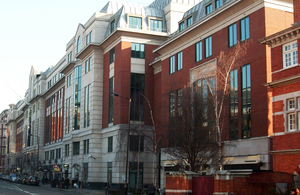Tough new measures to tackle drink drivers
Consultation on proposed new measures when testing drink drivers.

A package of tough measures to crack down on drink drivers has been unveiled today (22 November 2012) by Road Safety Minister Stephen Hammond.
Included in the proposals are plans to remove the statutory right to a replacement blood or urine test where a breath test reading is above and close to the legal limit, closing the loophole which allows those testing positive in breath to sober up while they wait for a blood or urine sample to be taken.
The government also intends to legislate to allow police the option not to perform a preliminary breath test where roadside evidential breath tests are carried out following the rollout of roadside evidential breath testing devices and give registered health care professionals greater roles in testing drink drivers - both of which options would speed up the enforcement process and deal with more drink drivers.
Stephen Hammond said:
We have made great progress in tackling drink drivers and the 2011 fatality figure for drink and drive accidents is the second lowest ever recorded.
However, last year 280 people died ruining the lives of families up and down the country so more needs to be done to eradicate this menace. That is why we are taking forward a package of measures to streamline enforcement against drink driving.
I am determined to make the jobs of those who deal with drink drivers easier and less bureaucratic so that bringing offenders to justice is not left to chance.
Currently, drivers who record less than 50 microgrammes of alcohol per 100 millilitres of breath have the right to demand a blood or urine test - despite being over the legal limit of 35 microgrammes per 100 millilitres. This is known as the statutory option.
This option dates back to the original introduction of breathalyser technology when there were concerns over reliability.
In his review of drink and drug driving Sir Peter North recommended the removal of the right to demand a blood or urine test as evidence showed people were using it as a delaying tactic. The government also believes that improvements in the accuracy of technology means that this option is no longer necessary.
The consultation also seeks views on removing the requirement for a preliminary breath test where roadside evidential breath testing is used. At the moment, when a suspected drink driver is pulled over by police, they undergo a preliminary breath test and are then taken to a police station for a further evidential test.
Results from the evidential test taken at police stations are the only ones used as evidence. Under the new plans, following the introduction of mobile evidential testing devices the police could perform the eventual test at the roadside so the preliminary test would not be required.
The government also want to see a wider range of registered healthcare professionals given the power to take evidential blood samples in hospitals and to assess whether a driver may have a condition due to a drug. This will enable tests to be carried out more swiftly, easing the pressure on doctors who are currently the only professionals with the authority to carry out the tests.
Other proposals within the plans include:
- commissioning further research into the current process used to decide whether a driver banned due to drink driving can regain their licence
- further exploration of how greater use can be made of vehicle forfeiture powers to get the most dangerous and irresponsible motorists off the road, including drink drivers
This consultation encompasses the legislative changes the government proposed in its response of March 2011 to the reports by Sir Peter North and the Transport Select Committee on drink and drug driving.
The consultation period runs until 2 January 2013.
Notes to editors
Mobile breath testing devices are still subject to type approval by the Centre for Applied Science and Technology and have not yet been deployed.
The report of the review of drink and drug driving law, Transport Select Committee: Drink and Drug Driving Law and government’s response to the reports by Sir Peter North CBE QC and the Transport Select Committee on drink and drug driving: command paper 8050 are available.
Roads media enquiries
Media enquiries 0300 7777 878
Switchboard 0300 330 3000